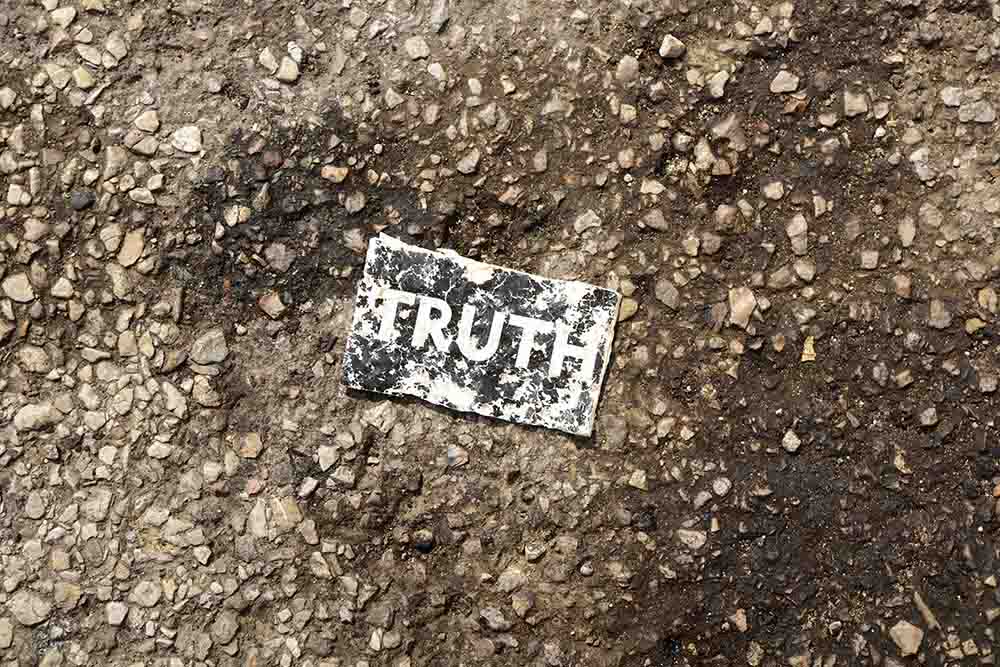The current state of society has come to depend on one simple concept—truth. Every other fact, every other value, action, justice, and principle resides on the fulcrum of what this one simple term means. The reductionists who cut, scar, and scorn the fundamental value of truth, and its centrality to every moral and ethical principle on which civil society is built, can only be assured of one certainty—their special place in Dante’s Inferno.
The unashamed and naked dismissal of truth, the intentional plying of lies and deception by those who have the privilege of speech is antithetical to the maintenance and preservation of every democratic institutional principle.
As speakers, we expect what we say to be accepted as true. As hearers, we expect what is said to us to be true. If it were not for these expectations, if they were not often enough satisfied, there would be little point in communicating at all.1 But this is exactly where nakedly unscrupulous, unprincipled leaders have brought us today.
They have battered, eroded, and betrayed every core value, every mission statement, and every social contract everywhere. There is no reason why anyone in government, in business, or in public life should today expect that what anyone says can be true, and there is no reason why anyone, anywhere should say anything that undermines their own interests, including lying and deceit.
The rules have been changed; it’s winner take all, my enemy’s enemy is my friend, and one should strike one’s adversary so hard that she is incapacitated from turning the other cheek. It is a no-holds-barred game now; an eye for an eye. Losing is simply not an option and sportsmanship signals weakness; it’s never compromise, never give in, and maintain control of the rulebook so that the rules can be changed to keep the advantage.
There are no more role models, only heroes who win and villains to be defeated. Diplomacy is a sham, justice is subjective, and power is supreme.
This is the ugly reality of the world today. One need not suffuse this narrative with examples; they will have resonated instinctively as you have read this. There is no truth left for religion in science; in politics; or in common sense. What is left is our own deluded acceptance of the subjectification of truth. There is no shame for the deluded in making bigotry, racism, and partisanship their defining values, the basis of their statements, and their embrace of ignorance and stupidity.
Worse, those who have severed their umbilical cords from the oxygen of humanity—the fundamental principle of moral and ethical participation in a community of civilized society—are not only hypoxic, they have altered the rules of communication. Not only have they abandoned truthfulness as a principle, but they have also normalized interpretative communication. What one says is no longer what one is saying—what we hear of their utterances and expect to inform us through their communication; instead, what is communicated is not the same as what is said.2
This is not a rhetorical observation; it has profound consequences for our daily lives.
Take, for instance, judicial proceedings. In a judicial proceeding, a witness has a solemn obligation “to tell the truth, the whole truth, and nothing but the truth.” Lying under oath (perjury) is a serious crime because it undermines the very framework of our judicial system. If witnesses may lie with impunity for personal or political reasons, justice can no longer be the product of the court system, and we descend into anarchy.
While citizen witnesses may lack the finesse to understand the technical and interpretative differences of giving testimony, those who have experience with the adversarial system can easily manipulate their statements in such a way so that one is not telling a lie, but saying something other than what is heard or seen. This is done by lying through omission, not giving full disclosure of one’s observations, exaggerating, and misrepresenting observations.
As Antomo, Müller, et al. have noted:
Linguistic strategies are the ways speakers manipulate their linguistic content of speech for their purpose. Consistently, linguistic strategies for lying are the ways liars manipulate the linguistic content of speech to mislead others, which could involve truthful statements. For example, if one asks a salesman whether ginseng is good for one’s health, the salesman could say: “People who eat ginseng every day live longer than others.” This may be true, but it is irrelevant to the question and is misleading. (People who eat expensive ginseng every day are wealthy and thus live better).3
Leaders ask their constituents to follow the rules, to make personal sacrifices, and to be patient, while they themselves bask in the sun, and pretend to have followed the letter of the law—with no regard for the message and modelling it conveys to our children.
There was a time when child witnesses were expected to be able to explain that they would “burn in the eternal fires of hell” if they lied under oath. Can one really believe today that our children who are subject to the falsehoods and manipulative persuasions of our business, political, and religious leadership feel the same degree of fear of the “eternal fires of hell”?4 Where is the moral direction, where is the moral responsibility, where is the social conscience?
Today, children and the rest of us understand this nuance of lying, of manipulative linguistics, in a way that normalizes evasion of truthfulness. Truth constrained by the potential of being caught in a lie or the consequences of being found out is forced, unnatural, and self-serving. And yet so many, if not the majority, of our institutions and processes are now founded on the belief that truth is an expedient commodity rather than a moral imperative.
Lying has become so mainstream, so infused in our lives, values, and practices that we mock the simpleton who is unable to muster the cunning to take advantage of loopholes, to beat the system, to have been caught for something they should have gotten away with. And as a society, we are obliged to pile on more rules, more regulations, and more laws because personal responsibility and moral and ethical constraints have become too much to expect.
Gone are the times when groups would ostracize the liar, the hypocrite, or the fraud; today, those who call out the liar, hypocrite, or fraud are more likely to be ostracized. Machiavelli seems resurrected. This is the reality from which an increasing number of political leaders are emerging; this is the peril in which the bystander, the complicit, and the uninformed have been ingredients. These are the conditions we the people construct and which frame who we are, what we ought to be, what we can be, and how we should conduct our relations to ourselves and to others.
The goal of moral and political deliberation should be to aim at the truth, to lay bare the false beliefs, to aspire to consensus in achieving the best ways to respond to collective (global) challenges. But even here we have learned through our response to the ravages of COVID-19, that we are incapable of holding together; that profits will prevail; that nations will squabble over supplies; that partisanship will prioritize popularity over remedy, and that those who can, will do anything to jump the line to gain the advantage over the needy.
This is a grim panoply; however, those who hold truth to power stand out. Those who uphold character remain steadfast, and truth is not a partisan commodity; it is not defined by culture, religion, or age. Truth is the fundamental principle of community life, of personal integrity, and of trust. If there is just one value we must all commit to reclaiming, it must be truthfulness. Yes, this is a lament; it’s ugly and even offensive. Is it wrong?
Anil Anand is a research associate with the Frontier Centre for Public Policy.
[show_more more=”SeeEndnotes” less=”Close Endnotes”]
- Deirdre Wilson and Dan Sperber, “Truthfulness and Relevance,” Mind 111, no. 443 (2002): 583–632.
- Ibid.
- Mailin Antomo, Susanne Müller, Katharina Paul, Markus Paluch, and Maik Thalmann, “When Children Aren’t More Logical than Adults: An Empirical Investigation of Lying by Falsely Implicating,” Journal of Pragmatics 138 (2018): 135–148.
- Nicholas Bala, “Children Witnesses in the Criminal Courts: Recognizing Competence and Assessing Credibility,” LawNow, January 5, 2018. https://www.lawnow.org/children-witnesses-in-the-criminal-courts-recognizing-competence-and-assessing-credibility/.
[/show_more]
Photo by Michael Carruth on Unsplash.



